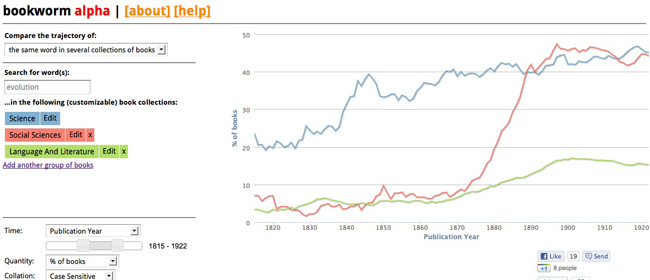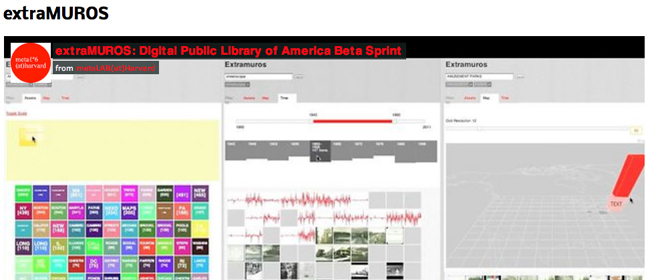Mindblown: a blog about philosophy.
-
Press: “Research Librarians Consider the Risks and Rewards of Collaboration”
“Big-scale collaborations and digital-era collection strategies took center stage at the Association of Research Libraries’ membership meeting, held here last week.”
-
Digital Library Digest: October 14, 2011
Jesse Shapins discusses extraMUROS, one of nine Beta Sprint projects invited to present at the Plenary. “While books are vital to the future of libraries, we believe that in an increasingly audiovisual world, it is essential that libraries also play a major role in making available innovative tools for interpreting society’s textual and audiovisual past,…
-

Interview with Ben Schmidt and Martin Camacho of Bookworm
Ben Schmidt and Martin Camacho from the Cultural Observatory at Harvard University sat down with me earlier this week to speak about their Beta Sprint project, Bookworm.
-
Press: “Digital Public Library of America: Pro and Con”
They are miles apart in their thinking about digital books, but the Association of American Publishers’ (AAP) president, Tom Allen, and Harvard University library director Robert Darnton came face to face to discuss the Digital Public Library of America (DPLA) on October 11
-

Interview with Jeffrey Schnapp of extraMUROS
Jeffrey Schnapp, faculty director of the metaLAB (at) Harvard, discusses extraMUROS, one of nine Beta Sprint projects selected for presentation at the October 21 plenary meeting.
-
Press: “LJ/SLJ Ebook Summit Panelists Remind Librarians of an Old Creed: Free to All”
The DPLA will make available tools and services to other libraries, such as open source code and a store of metadata, but content was a big part of what it hopes to offer.
-
Press: “DLF/DCC DPLA Beta Sprint Effort to be presented at DPLA Plenary”
The project prototype leverages the Institute of Museum and Library Services’ Digital Collections and Content (IMLS DCC) resource and DLF Aquifer content as a core collection for the DPLA.
-
Notes from the field: One library science student’s take on the DPLA
From my perspective as a library science student, it seems to me that the DPLA has an opportunity to become a catalyst for a large-scale turn in how we as a society choose to organize and contextualize our collective knowledge online.
-
Press: “Zeega Imagines New Forms of Libraries and Archives”
“We feel that extraMUROS and Zeega can be particularly powerful in helping the DPLA forge alliances between cultural heritage institutions of all types and scales, allowing citizen scholars, teachers, local historical societies, public libraries, schools, colleges, museums and libraries to form an interconnected web of shared knowledge.”
-
Digital Library Digest: October 7, 2011
Rebecca Rosen reports on the new DPLA website. “For everything that it is possible to read and study on the Internet, there’s still so much out there that’s not online. Of particular interest to students and scholars, are the troves of books and archival materials squirreled away in libraries. And while many libraries (and Google, though…
Got any book recommendations?